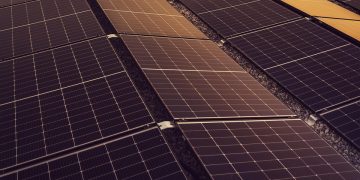Power Struggle: The Battle Between Solar and Wind Energy
In the ongoing battle for renewable energy dominance, two key players have emerged as frontrunners: solar and wind energy. Both sources have their own unique advantages and challenges, making it difficult to determine which one is the best option for powering our future. In this article, we will delve into the power struggle between solar and wind energy, exploring their strengths, weaknesses, and the potential impact they could have on the environment and economy.
The Rise of Solar Energy
Solar energy has experienced a meteoric rise in popularity in recent years, thanks to advancements in technology and decreasing costs. Solar panels, which convert sunlight into electricity, have become a common sight on rooftops and in solar farms around the world. One of the key advantages of solar energy is its scalability – solar panels can be installed on a small scale for individual homes or businesses, or on a larger scale in solar farms that generate electricity for entire communities.
Another major advantage of solar energy is its environmental benefits. Solar panels produce electricity without emitting greenhouse gases or other harmful pollutants, making them a clean and sustainable energy source. In addition, solar energy is abundant and inexhaustible – the sun shines every day, providing a virtually limitless supply of energy.
The Challenges of Solar Energy
Despite its many advantages, solar energy also faces several challenges that have hindered its widespread adoption. One of the biggest challenges is the intermittency of sunlight – solar panels only generate electricity when the sun is shining, making it difficult to rely on solar energy as a constant source of power. This can be mitigated to some extent by using energy storage systems, such as batteries, to store excess energy for use when the sun is not shining.
Another challenge is the issue of land use – solar panels require a significant amount of space to generate electricity, which can be a concern in densely populated areas where land is limited. Additionally, the production and disposal of solar panels can have environmental impacts, such as the use of toxic chemicals in the manufacturing process and the generation of electronic waste when panels reach the end of their lifespan.
The Ascendancy of Wind Energy
Wind energy has also seen significant growth in recent years, with wind turbines becoming a common sight on land and offshore. Wind turbines harness the power of the wind to generate electricity, with the spinning blades turning a generator to produce electricity. Like solar energy, wind energy is a clean and renewable energy source that produces no greenhouse gas emissions or other pollutants.
One of the key advantages of wind energy is its reliability – wind is a more consistent energy source than sunlight, making wind turbines a more reliable source of power. Wind energy can also be scaled up or down to meet the needs of different communities, making it a flexible and versatile energy source.
The Challenges of Wind Energy
Despite its many advantages, wind energy also faces challenges that have slowed its widespread adoption. One of the biggest challenges is the issue of aesthetics – some people find wind turbines to be unsightly and disruptive to the landscape, leading to opposition to wind farm projects in some areas. Additionally, wind turbines can be noisy and may pose risks to birds and other wildlife.
Another challenge is the issue of intermittency – while wind is a more consistent energy source than sunlight, it is still subject to fluctuations in wind speed and direction. This can make it difficult to rely on wind energy as a constant source of power, especially in regions with variable wind patterns. Like solar energy, this challenge can be mitigated by using energy storage systems to store excess energy for use when the wind is not blowing.
The Future of Renewable Energy
As the battle between solar and wind energy continues to unfold, it is clear that both sources have a role to play in our transition to a more sustainable energy future. Each source has its own unique strengths and weaknesses, and the best approach may be to combine the two to create a more reliable and resilient energy system.
By integrating solar and wind energy with other renewable sources, such as hydroelectric and geothermal power, we can create a diverse and balanced energy portfolio that can meet the needs of a growing population while minimizing our impact on the environment. This approach, known as a “smart grid,” can help to smooth out the fluctuations in energy production from solar and wind sources, ensuring a more stable and reliable energy supply.
Conclusion
In conclusion, the battle between solar and wind energy is not a zero-sum game – both sources have their own unique advantages and challenges, and the best approach may be to harness the strengths of both to create a more sustainable energy future. By investing in a diverse and balanced energy portfolio that includes solar, wind, and other renewable sources, we can reduce our reliance on fossil fuels and create a cleaner, greener future for generations to come.
Ultimately, the power struggle between solar and wind energy is not just about choosing one over the other – it is about finding the right mix of renewable energy sources to power our world in a way that is sustainable, reliable, and environmentally friendly.
By working together to overcome the challenges and maximize the benefits of solar and wind energy, we can create a brighter future for ourselves and for the planet.





